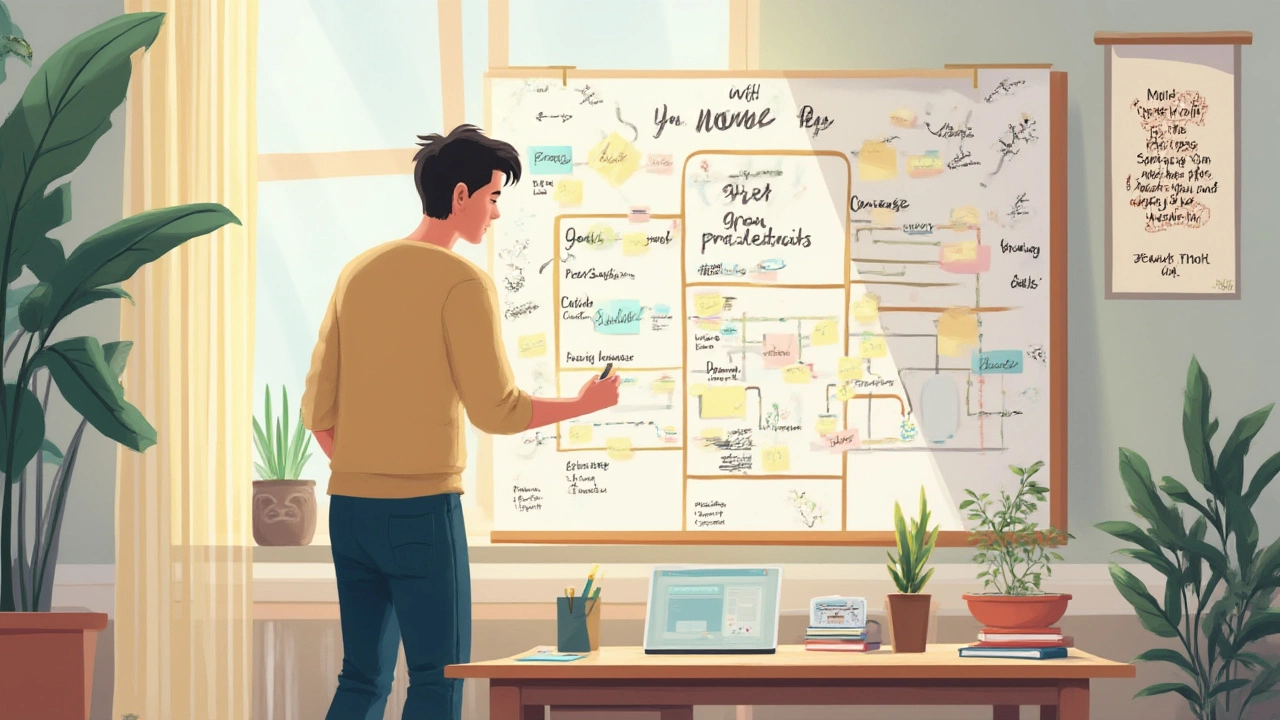Your mind is wired to keep you safe, but sometimes safe just feels like stuck. You watch people bounce back from the worst blows, while you’re floored by a late-night email or a friend’s snide comment. Here’s a weird fact: elite athletes train their minds just like their muscles, and researchers from Harvard say mental strength explains success more than raw talent. So why does 'mental weakness' feel like some secret shame we’re supposed to hide?
Recognizing Signs of Mental Weakness
If you want to stop being weak mentally, you have to know how to spot it in the first place. That uneasy pit in your stomach before a big talk, the voices that tell you that you’re not good enough, the tendency to give up after one bad day—these aren’t flaws. They’re signals. According to a 2021 study by Stanford, people who struggle with mental resilience often share habits like overthinking setbacks, fearing mistakes, and giving way too much energy to criticism, even if it’s just in their heads. Mental weakness doesn’t mean you’re fragile or broken. It shows up in little ways: procrastinating instead of taking action, avoiding hard conversations, getting overwhelmed by changes, or ruminating over embarrassing moments for days.
One excessively common example? Dwelling on setbacks. The brain is hardwired for negativity bias, meaning we remember criticism and mistakes five times more strongly than compliments. Harvard neuropsychologist Dr. Shelley Carson says this worked well in ancient times when high alert meant survival, but today it means we sometimes stay locked in a mental loop of self-doubt. Maybe you notice you avoid challenges and new experiences because you fear failure. Or you replay past embarrassments like a bad movie stuck on repeat. If you blow up at small stressors or bounce between extremes, you might be tired out by your own thoughts.
Mental weakness sometimes hides as perfectionism too. I’ve fallen into that trap myself—when one typo in a work email ruined my night, Lucas had to laugh and remind me most people barely notice. Mental weakness can mean obsessing over small mistakes instead of focusing on your strengths or the bigger picture. It sometimes feels like “people-pleasing,” where you say yes even when you want to say no, just to avoid uncomfortable feelings.
Here’s a quick exercise: do a mental inventory. For the next week, track what triggers your self-doubt or emotional spirals. Do they hit after criticism, social rejection, or just on Sunday afternoons? Recognizing where your mental Achilles’ heel is gives you a map. Once you spot the pattern, you have a starting point to build strength instead of sidestepping it.
The Science Behind Mental Strength
Mental strength isn’t a superpower—you weren’t born lacking it. Neuroscientists know your brain is like Play-Doh: it changes. There’s even a name for it: neuroplasticity. With regular effort, you can literally rewire your mind’s response to challenges. In a 2023 study published in the journal "Nature Human Behaviour," researchers tracked 977 adults over two years. People who practiced small acts of self-control and “distress tolerance” boosted their resilience scores by nearly 35%—even those who considered themselves naturally anxious.
Another fact that still blows my mind: willpower isn’t something you run out of forever. Studies show it’s more like a muscle that gets tired if you overuse it, but grows stronger with exercise. When I started waking up early for morning walks, the first week was a nightmare—Lucas pointed out I was grumpier than our neighbor’s cat. But after a month, I noticed it was easier to resist snooze, and even work stress wore me down less. The brain learns by repetition. Make a habit of pushing through tiny discomforts, and you’ll see bigger challenges get less scary.
Check this out:
| Mental Strength Factors | Scientific Findings (2023) |
|---|---|
| Resilience Training | 35% increase in mental resilience after 12 weeks daily practice |
| Journaling | Reduces rumination and anxiety by 27% |
| Mindfulness Meditation | Improves emotional regulation within 4-8 weeks |
| Physical Exercise | Lowers symptoms of depression and anxiety by 40% after 6 months |
Now, if “mental strength” sounds military, you’re picturing it wrong. There’s a warmth to it; it’s having your own back, even on days you mess up. British psychologist Dr. Julia Harris calls it “compassionate grit.” It means you can bounce—a setback doesn’t flatten you, and you keep your focus on what matters instead of every little storm blowing your way. If the science says you can build it, there’s no mystery or shame in starting small.

Strategies to Build Mental Strength Daily
Let’s get practical. Building mental strength isn’t about big, dramatic moments. It’s tiny acts, repeated until your brain gets the message: “I can handle this.” One foolproof strategy is to reframe failure. When I miss a deadline or fumble socially, my first thought is often, “I messed up again.” But I started challenging that by asking: “What would I say to Lucas if he did the same?” Usually, it’s something like, “You had a rough day, but that doesn’t mean you’re a disaster.” Try talking to yourself like a friend. Self-compassion is proven—by researchers from Oxford, no less—to lower stress hormones and boost motivation more than harsh self-criticism ever does.
Here’s a four-step path to practice every day:
- Notice Your Triggers: When your mood tanks, pause. Jot down your thoughts. Is it criticism? Feeling left out? Uncertainty?
- Challenge Old Stories: If that voice says, “You’re always a failure,” ask, “Always? Or just today?” Evidence often tells a different story.
- Take Action, Even When Uncomfortable: Do one thing daily that feels hard—set a boundary, try a new activity, speak up. Confidence grows from action, not planning.
- Reflect and Reset: At the end of the week, list three times you didn’t give up. It’s proof you can do hard things.
One trick I picked up is practicing gratitude—yes, everyone says it, but there’s data behind it. Keeping a short gratitude journal every night trains your mind to notice what goes right. According to a study in the “Journal of Positive Psychology,” gratitude journaling just twice a week halves the time it takes to bounce back from rejection. Another key is managing your physical health. Sleep, regular meals, and movement keep your brain more resilient. Miss enough sleep, and even tiny setbacks feel enormous—the science backs that up.
If you’re like me and sometimes overthink everything, mindfulness meditation helps. You don’t have to sit cross-legged chanting “Om”; just set a timer for five minutes and focus on your breath. I use an app on my phone—some days are a mess of thoughts, others feel almost peaceful, but the more I do it, the easier it gets to let stressful feelings pass instead of snowballing. Mental strength means you ride the waves of emotion without getting pulled under.
Breaking the Cycle of Self-Doubt
Self-doubt is a shape-shifter—it talks you out of new things, eats up your confidence, and sometimes even convinces you that you’ll never change. When those inner critics shout the loudest, it helps to name them. I call mine “the Doom Trio.” (No judgment!) The first: Catastrophe Carla, who expects worst-case scenarios for everything. The second: Comparison Casey, who assumes everyone else has it all together. Third: Perfectionist Pat, who wants everything flawless or nothing at all. When I name them, their power shrinks.
Want to silence your own critics? Try this:
- Write down the worst thing your inner critic says and ask, “Would I say this to Lucas or a friend?”
- Find evidence for and against those thoughts. Fact-check your brain. Your feelings are real, but not every thought deserves to be believed.
- Replace “I can’t” with “I haven’t yet.” Giving your brain possibilities creates space for growth instead of a dead end.
- Celebrate small wins. Every time you finish that scary project, set a healthy boundary, or just get out of bed on a rough day—count it as progress. Habits are built this way.
Another handy tip: limit doomscrolling. Researchers at the University of Pennsylvania showed scrolling through negative news or social media spirals increases anxiety more than any single real-life event. I started setting a timer for app use (my guilty pleasure is foodie reels) and it gave me back time—and brain space—to do things that replenish me. Instead of tying your worth to likes or other people's judgements, invest energy into your own progress chart. You’ll notice the grip of self-doubt begins to loosen when you focus more on your journey and less on the highlight reels of others.
One last point on this: don’t be afraid to ask for help. It isn’t a sign of weakness. Even pro athletes, CEOs, and performers have coaches and mentors. If you feel like your self-doubt is paralyzing, talk to someone—a professional, a trusted friend, a support group. Community is a massive part of building mental strength. Studies show that people who feel connected and supported build stronger resilience after setbacks, and recover faster from stress.

Transforming Setbacks into Strength
If you want to stop being weak mentally, you’ll have to get comfortable failing forward. Every successful person credits their biggest growth to failure, not effortless wins. It’s not a pep talk—it’s fact. Research from Duke University found people who fail and reflect on what went wrong become 50% more likely to succeed in their next effort, compared to those who give up or blame others. The process scientists call “productive failure” wires your brain to look for solutions, not excuses.
Next time you hit a setback—maybe you miss an opportunity, mess up a project, or get rejected—pause and ask yourself:
- What can I learn from this?”
- Did I do anything right?
- What would I do differently next time?
I used to take mistakes as proof that I was just not good enough. Lucas is the master at reframing. If he forgets an important date or bombs a home project, he shrugs and says, “Did I die? No. Did anyone else die? No. Then it’s a lesson, not a tragedy.” Try adopting this attitude. When you see mistakes as part of the learning curve, your stress drops, and your mind becomes quicker to adapt.
An old-school trick that still works today is to physically get moving after a tough moment. Go for a brisk walk, tidy up your space, do something that changes your scenery. Movement triggers dopamine, the “feel-good” chemical, and turns mind spirals into problem-solving mode. By creating new experiences after setbacks or embarrassment, your brain learns “setback doesn’t mean stop—it just means reset.”
Here’s a list of ways to turn setbacks into a superpower:
- Keep a “failure log”—one sentence about something that flopped, and one lesson learned.
- Seek feedback instead of empty reassurance.
- Switch your goal from “never messing up” to “growing a little stronger every week.”
- Find role models who talk openly about their stumbles—turns out, the most successful people are the most candid about failure.
Remember, every time you get knocked down, you’re practicing the art of resilience. You teach yourself you can get back up, and every bounce-back boosts your sense of self. It's not about being the toughest or never letting things get to you; it’s learning that even bad days are just days, not life sentences.







